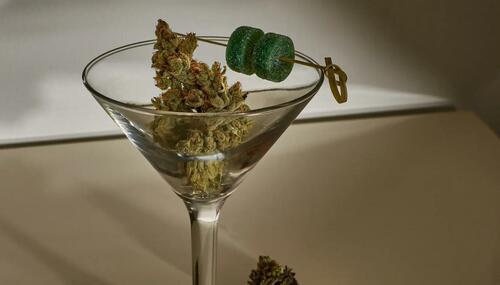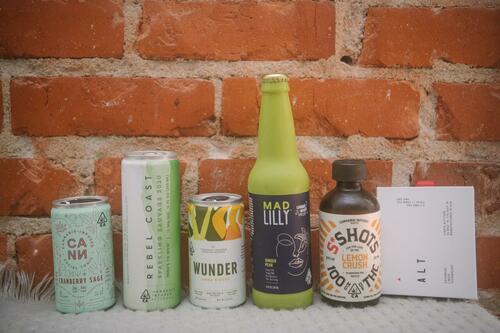“Hangover-Free” Weed-Infused Beverages Becoming All The Rage
As recreational marijuana becomes legal in a growing number of states, cannabis-infused, alcohol-free ‘mocktails’ have emerged as a new, healthier alternative for those who wish to imbibe.
And since liquids are absorbed far more quickly in the stomach than solids (such as pot cookies), these drinks – which include seltzers and alcohol-free wines – have seen a flood of demand.
According to Colorado-based research firm BDSA, dolalr sales of marijuana beverages were up approximately 65% between 2020 and 2021 in the 12 states they track. California – the #1 consumer of weed drinks – saw the number of cannabis beverages available nearly double during the same period, with at least 747 distinct products now available, according to the NY Times.
Pabst, known for its Blue Ribbon beer, now sells lemon-flavored “High Seltzer,” a canned cannabis drink promising “a different kind of buzz.” The cannabis beverage company Cann calls its carbonated cocktails “social tonics”; it also sells “roadies,” cannabis-infused drink mix in ready-to-go foil packets. Rebel Coast, a California-based winemaker, makes cans of alcohol-free sparkling wine infused with 10 milligrams of THC.
Cannabis-infused beverages are often branded as a healthier alternative to alcohol — “No painful days after drinking or regrets,” a tagline on Cann’s site reads. These kinds of drinks carry a connotation of health, said Emily Moquin, a food and beverage analyst at Morning Consult. They tout themselves as “hangover-free” and without the high calories of alcohol; they claim to help you feel “focused,” balanced, relaxed. One cannabis beverage company even suggests pairing their drinks with a spa day.
Previous attempts to infuse THC into beverages were unsuccessful or produced a terrible tasting drink because the cannabinoid is hydrophobic – and doesn’t mix easily. In recent years, however, ‘nanoemulsion’ technology has allowed for cannabinoids to be smoothly blended into a seltzer or cocktail.
According to a July survey, nearly 19% of millennials say they’ve tried a THC-infused beverage – a number which Emily Moquin expects to grow as Marijuana is increasingly marketed as a form of self-care.
“It’s associated with health benefits, things like sleep, anxiety reduction — some things that people might reach for a drink to try to solve,” she said.
Just don’t drink too much
As anyone who’s done edibles knows, it takes some time to kick in. What’s more, standards of potency vary – though most experts consider 5 milligrams of THC to constitute a single dose.
According to Headset, a company that collects and analyzes data on cannabis, more than 50% of cannabis drinks sold in the US in 2021 contained 100 milligrams of THC, an amount that could seriously intoxicate a person.
Most edibles, on the other hand, contain 5 or 10mg doses.
“If you tell someone, this is an 8 percent beer, they say, ‘That’s a strong beer,’” said James MacKillop, director of the Michael G. DeGroote Centre for Medicinal Cannabis Research at McMaster University. “If you tell someone this is a 20 milligram drink versus a five milligram drink, that’s Greek to many people.”
Tyler Durden
Tue, 08/23/2022 – 22:25
via ZeroHedge News https://ift.tt/8REcky1 Tyler Durden

